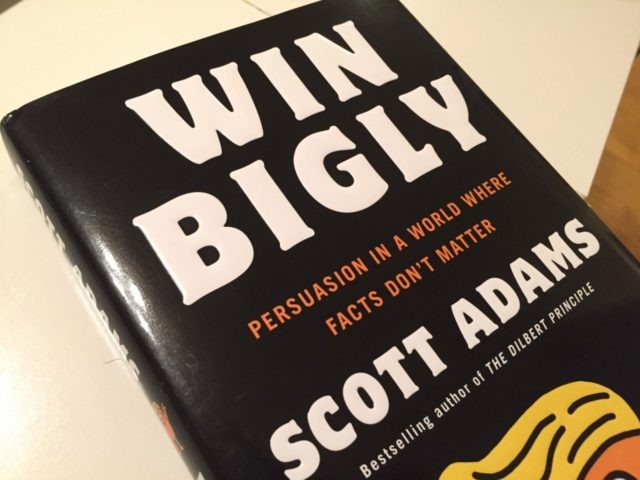I’m going to tell you how Scott Adams re-wired my brain.
When a Democrat-aligned group ran an ad recently in Virginia showing a white man in a pickup truck with an “Ed Gillespie” bumper sticker chasing down dark-skinned children, I was outraged. So were other people — enough that the Republican surged briefly in the polls for Virginia governor.
But something nagged at me: the ad it was unforgettable. Didn’t that mean it would be more effective, in the end?
That was Scott Adams in my head, and over the course of the 2016 presidential election, he changed the way I look at political rhetoric.
By the time you finish Win Bigly: Persuasion in a World Where Facts Don’t Matter, you will not only understand that election in an entirely new way, but you will see your whole world differently.
The book does so much more than recap his prescient analysis of the presidential race: it argues for a new theory of perception.
Adams believes that humans are not actually rational beings, and that we do not perceive reality accurately. He explored that idea tangentially over the 2015-16 cycle, often in between pointing out the genius of some Trump tweet or another. But in Win Bigly, he gives that theory the book-length treatment it is due. He draws on the election for evidence to support his argument, and teaches the reader how to do, or at least understand, what Trump did.
Adams contends that our perceptions of the world are determined by a particular filter, a way of explaining how things happen. The devout prefer a religious filter; the Marxist might prefer a class filter; and so on.
None of these filters is completely accurate, and we often twist ourselves into knots when reality fails to conform to our filter. Adams calls that “cognitive dissonance,” and he says it explains the media freakout over Trump’s eventual victory.
The best filter for understanding 2016, he suggests, was the “persuasion” filter, which looked at how effectively the candidates were influencing people, not at whether they were telling the truth or whether they were morally right.
In that light, he says, it was clear from the first primary debate that Trump was a “Master Persuader,” deploying “weapons-grade” skills against a hapless field of conservative amateurs and then the hopeless Hillary Clinton.
It was delightful enough to follow along with Adams in real time during the election — and to interview him, as I was fortunate enough to do in August 2016, when Trump was at his lowest. (Adams observed of Trump: “His actions look like the actions of someone who is not trying to win at the moment.” That changed.)
What is amazing about Win Bigly is how much new material there is, how much further Adams takes his insights and conclusions.
This is more than a history book, or a personal account of what Adams calls the most fun year of his life. It is also useful — a rare quality in political books. Adams sprinkles persuasion tips throughout the text, helping readers to apply the lessons of the 2016 to achieve their own goals. Before you realize it, he has not only trained your brain to help you understand more of what is on cable news, but he has also — with luck — helped you improve your life.
Towards the end, Adams wonders aloud whether his commentary throughout the election merely described what was happening, or changed it in some way. He cites several interesting examples of how the Trump campaign seemed to follow his recommendations — such as physically embracing black people to counter accusations of racism.
What is clear is that his ideas affected how journalists, especially conservative ones, began to cover the election.
For example, when Project Veritas videos showed Democratic operatives provoking violence at Trump rallies, it was not immediately clear how that was relevant to the election. But Adams had pointed out that Clinton’s most persuasive tactic was to frighten voters about Trump’s instability.
So conservative media cited the Project Veritas exposé to “prove” that Clinton, in fact, was the one deliberately sowing chaos. Trump grabbed that and ran with it.
The book provokes a few questions. At one point, Adams suggests that Trump would have won even if he had run as a Democrat and copied his platform from Sen. Bernie Sanders (I-VT). Would Republicans be as freaked out as Democrats have been?
I’d like to think that instead of denouncing Trump as the next Stalin, Republicans would have improved their own persuasive tactics. (Judging by the Virginia election result, Democrats are on their way.)
I also wonder about the title. Win Bigly seems to appeal to Trump supporters. But Adams could have reached more Democrats by “pacing and leading” — i.e. by seeming to agree with them that Trump is a monster, before revealing the genius of his method (and debunking their fears).
Perhaps The Russian Method would have sold even better. On the other hand, perhaps the anxious Republicans are overdue for a reminder about what works, and what doesn’t.
A word of warning: knowing the tricks of persuasion will not enable you to evade it, nor the “cognitive dissonance” that we can spot in others but rarely see in ourselves.
A case in point: Breitbart News’ own “base vs. establishment” filter struggled to anticipate Virginia. The “anti-Trump” filter was probably no better (though even a broken clock is right twice a day).
Other factors were at work — including weapons-grade persuasion on the back of a pickup truck.
Joel B. Pollak is Senior Editor-at-Large at Breitbart News. He was named one of the “most influential” people in news media in 2016. He is the co-author of How Trump Won: The Inside Story of a Revolution, is available from Regnery. Follow him on Twitter at @joelpollak.

COMMENTS
Please let us know if you're having issues with commenting.